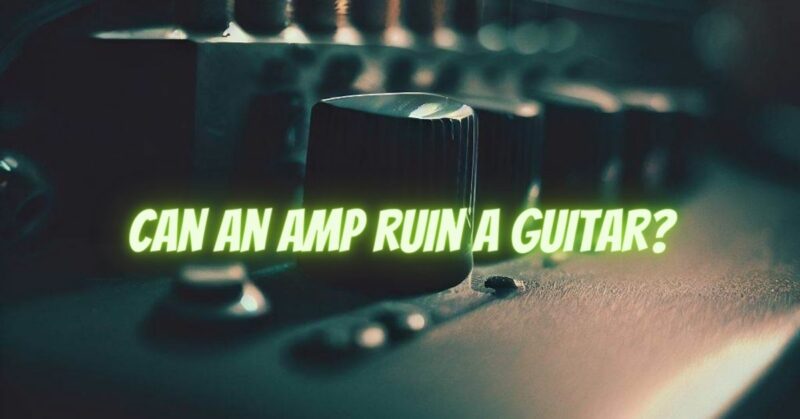When it comes to playing the guitar, the amplifier plays a crucial role in shaping your tone and providing the necessary amplification. However, there may be concerns about whether a guitar amp can potentially damage your instrument. In this article, we’ll delve into the relationship between a guitar amp and your guitar, exploring whether an amp can cause harm and what precautions you can take to ensure the longevity of your instrument.
Understanding the Amplifier-Guitar Relationship:
- Speaker Damage: One area where an amplifier can potentially cause damage to your guitar is through the speaker system. If the amp is driven too hard, producing excessive volume levels or distorting heavily, it can generate vibrations that may damage the speaker cones. Prolonged exposure to high volumes can potentially result in cone tearing or voice coil damage. It’s essential to strike a balance between achieving the desired tone and avoiding excessive stress on the speaker components.
- Tube Amplifiers and High Voltages: Tube amplifiers are known for their warm and dynamic tone. However, they utilize high-voltage circuitry, which can pose a risk if not handled properly. Mishandling or improper maintenance of tube amps can result in electrical shocks or damage to the amplifier itself. It’s crucial to follow the manufacturer’s guidelines, use appropriate power sources, and have the amplifier serviced regularly by qualified technicians to minimize any potential risks.
- Input and Output Jacks: Over time, the constant plugging and unplugging of your guitar cable into the amp’s input jack can lead to wear and tear. Loose or damaged input jacks can cause intermittent connections, affecting the guitar’s signal and potentially causing static noise or signal dropouts. Similarly, faulty output jacks can result in poor connection between the amp and external speaker cabinets. Regularly inspecting and maintaining these connections can help prevent potential issues.
Protective Measures:
- Volume and Gain Management: Excessive volume levels and high gain settings can potentially strain both your amplifier and guitar. It’s important to find an appropriate balance that allows you to achieve your desired tone without pushing the limits of your gear. Be mindful of the volume levels and gain settings, especially when using distortion or overdrive effects.
- Proper Handling and Storage: When transporting your guitar and amp, ensure they are securely stored and protected from physical damage. Avoid subjecting your gear to extreme temperatures, humidity, or moisture, as these environmental factors can negatively impact both the instrument and the amplifier.
- Regular Maintenance: Routine maintenance of your guitar and amp is crucial for optimal performance and longevity. Keep your guitar clean, change strings regularly, and inspect the amp for any signs of wear or potential issues. If you notice any abnormalities or concerns, consult a qualified technician for professional assistance.
Conclusion:
While a guitar amp has the potential to damage your instrument if mishandled or pushed beyond its limits, with proper care and responsible usage, the risk of damage can be minimized. Understanding the relationship between your guitar and amp, maintaining appropriate volume levels, and regular maintenance are key to ensuring both the guitar and the amplifier perform at their best for years to come. By taking these precautions, you can enjoy the benefits of your guitar amp while preserving the integrity of your instrument.


